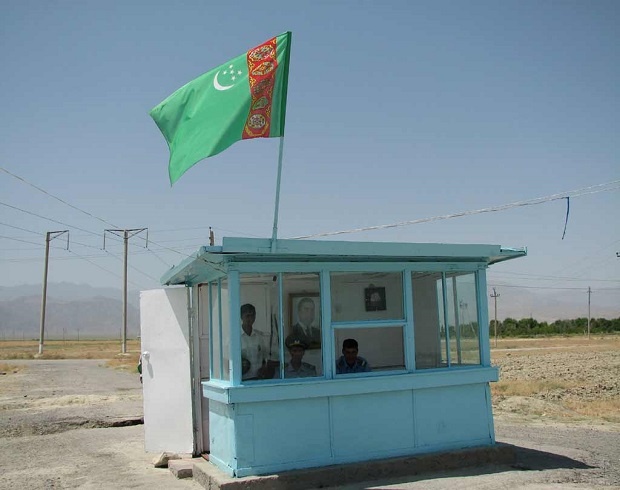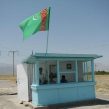
Russian and Uzbek Soldiers Reportedly Now in Turkmenistan to Counter Afghan Threat
Publication: Eurasia Daily Monitor Volume: 12 Issue: 59
By:

In a measure of just how frightened Ashgabat is of the possibility that Afghan radical forces will invade Turkmenistan, it has reportedly allowed Russian and now Uzbekistani military personnel to provide help in fortifying its border and has appealed to the United States for military assistance as well. All this is a major departure from Turkmenistan’s constitutionally-mandated neutrality and its isolationist practice over the last two decades. And this development raises questions about what Russia may do next in Central Asia more generally.
Turkmenistan has been publicly reinforcing its border defenses in recent months (see EDM, February 26, 2014; March 13, 2015), employing not only its own soldiers, whose leaves have been cancelled so that they can help but also, albeit without fanfare, specialists from Russia as well, according to the web site Khronika Turkmenistana. More recently, the news agency says, these forces have been joined by detachments of border guards from Uzbekistan. But neither of these developments has been officially confirmed by Ashgabat (Islamsng.com, March 26).
Ashgabat has been particularly worried about the worsening security situation on the other side of its 744-kilometer-long border with Afghanistan. Specific points of concern have included the February 2014 penetration of Turkmenistan’s territory by Islamist militants; the September 2014 report by the Russian president’s special emissary for Afghanistan that “major forces” of Islamist radicals are concentrated in the northern portions of that country; and more recent claims that Ashgabat, like Dushanbe, may now face militant units of the Islamic State (formerly known as Islamic State of Iraq and Syria—ISIS), a group that wants to establish Islamic rule over all Muslims, including those in what was Soviet Central Asia.
Moscow has been strengthening its military presence in Tajikistan, where the 201st motorized rifle division is located, and thus it would not be inconsistent with Russian policy for it to dispatch military personnel into Turkmenistan. Yet, at the same time, the Russian military’s presence in Turkmenistan would be inconsistent with Ashgabat’s policies and practices. And if, as seems likely, Moscow has been allowed to do so, this suggests that Turkmenistan’s rulers are really frightened—something that the reported presence of Uzbekistan border guards only reinforces.
At the same time, and clearly in the hopes of simultaneously improving its security situation and maintaining its independence from Moscow, Ashgabat has appealed to Washington for arms. Given the Crimean precedent, no leader anywhere in the former Soviet space is likely to believe that Russian troops would ever leave if they were allowed to come in the first place.
As Viktoriya Panfilova reports in the March 31 issue of Nezavisimaya Gazeta, United States General Lloyd Austin, the commander of US Central Command, told Congress that Washington has indeed received such a request for arms, but not personnel, to defend against an Islamic State threat emanating from Afghanistan. Any such assistance, he said, would require Congressional authorization (Nezavisimaya Gazeta, March 31).
Panfilova also provides some additional details on the cooperation between Russia and Turkmenistan. She cites Shokhrat Kadyrov, of the Moscow Institute of Oriental Studies, to the effect that Moscow will certainly promise “assistance to the Turkmen leadership if the situation on the border with Afghanistan deteriorates.” But other Russian experts are less certain that Moscow would really be ready to send troops or that Ashgabat would be willing to accept them. According to Arkady Dubnov, a Russian specialist on Central Asia, the Crimean precedent looms over everything. Turkmenistan does not want a permanent Russian presence, he says, and Moscow would find it difficult to explain to the West any military moves of this kind now.
The real questions are much larger, according to Panfilova. First, there is the issue of just how large a threat Islamic State forces in Afghanistan represent and who, if anyone, controls them. Kabul repeatedly has played down their number, and Aleksandr Knyazev, another Moscow specialist on the region, says that the forces now being organized in northern Afghanistan may have less to do with Islamic State than with Turkey, which wants to bring pressure to bear on Ashgabat concerning gas pipeline routes.
And second, as Igor Preobrazhensky, a Russian scholar of Central Asia says, there is the question of what Moscow would face if the Islamic State does obtain a foothold in that region in Turkmenistan or elsewhere and even succeeds in overthrowing one or more of the brittle authoritarian regimes there. In that event, he says, the Russian government would face the threat of massive and uncontrolled refugee flows from the region, flows many ordinary Russians would certainly view as filled with terrorists. That could spark even more xenophobia and ethnic violence than one can observe in Russia now (Centrasia.ru, March 31).
Over the last year, Preobrazhensky says, Moscow has been so focused on what it views as its contest with the West over Ukraine that it has devoted less attention than it should to the growing instability in Central Asia. But now that there is a real threat, at least in the eyes of Turkmenistan, the Russian authorities are having to rethink their position about that region, especially since the Kremlin views Central Asia as part of Russia’s historical zone of influence. Sending troops carries with it real risks, but so too, he says, does not doing so.




